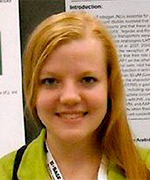Arts and Sciences 3MT Competition
Wednesday, March 2, 2016
9–11 a.m.
CUE 518
Refreshments will be served
Open to the public
On Wednesday, March 2, 2016, the College of Arts and Sciences hosted a semi-final round of the 2016 WSU Three-Minute Thesis competition.
- The CAS winner will receive a $1,000 fellowship for fall 2016 and advance to the WSU finals on Tuesday, March 22.
- The runner up will receive a $500 fellowship for fall 2016.
- CAS people’s choice will receive a $500 fellowship for fall 2016.
2016 CAS COMPETITORS
Molly Perchlik
Winner

Botany
9:50 a.m.
The importance of nitrogen partitioning processes for plant performance
Nitrogen (N) is an essential nutrient that plants need in large amounts for growth and development. It is required for the synthesis of amino acids, proteins, nucleic acids and many essential metabolites. In industrial countries, extensive N fertilizer use guarantees high crop yield. However, this level of fertilizer production and application is not sustainable because of costly high-energy inputs and negative effects on human health and the environment through greenhouse gas emissions and water pollution. In developing countries, on the other hand, access to N fertilizer is limited and insufficient N nutrition results in low crop productivity and ultimately in reduced food supply. A solution to these issues could be the production of crops that use N more efficiently and require less N fertilizer. One potential strategy for improving N use efficiency in plants is to regulate N allocation to specific plant organs for optimum growth.
In general, partitioning of N within plants occurs in the form of amino acids. Transport proteins in cellular membranes are necessary to move amino acids into cells and over long distances. Our lab has identified transporters that play central roles in allocation of amino acids to growing plant organs. We found that manipulation of amino acid transporter expression in Arabidopsis and pea plants results in improved seed yields under high N conditions. In this study, it is hypothesized that the transgenic Arabidopsis and pea plants continue to outperform non-transgenic plants under reduced N fertilization, and that alteration of N transport processes leads to more efficient N use. The transgenic lines were grown under a deficient, limiting or sufficient N fertilization regime, and physiological, biochemical and molecular analyses were used to determine plant N use efficiency and nutritional status. Results showed that the transgenic plants display increased N use efficiency under all N conditions tested. Additionally, Arabidopsis and pea plants with modified N transport required half the amount of N to produce as many fruits and seeds as their non-transgenic counterparts. Overall, it was demonstrated that altering amino acid allocation presents an effective strategy to improve plant yields, while reducing the input of N fertilizer.
Kayela Robertson
Runner up

Clinical Psychology
9:55 a.m.
Naturalistic assessment using a simulated environment: Cognitive correlates and relationship to functional status in individuals with neurologic conditions
Research has shown that neurologic conditions, such as traumatic brain injury, stroke, and multiple sclerosis, result in a number of cognitive and functional deficits. However, little is known about the relationship between various cognitive domains and ability to perform everyday activities. The Community Shopping Task (CST), a naturalistic assessment task conducted in a simulated environment, will be used to examine functional abilities and cognitive correlates of everyday functioning in individuals with neurologic conditions. Approximately 36 participants with neurologic conditions and 36 healthy controls will complete the CST as well as traditional paper-pencil tasks evaluating immediate and delayed memory, language, attention, visuospatial/constructional skills, and executive functioning. In addition, all participants will complete a questionnaire assessing instrumental activities of daily living. This will be one of the first studies to examine a novel naturalistic task in a simulated environment. The results will improve our understanding of how the CST is related to cognition and everyday functioning. If the CST is found to be related to everyday functioning more so than the traditional paper-pencil cognitive measures, the study will result in greater knowledge regarding the potential benefit of using more naturalistic tasks in assessment. Furthermore, the results of this study may help to provide support for the use of simulated environments in a number of settings due to the ability to create more ecologically valid tasks for assessment.
Cristina Wilson
People’s Choice

Experimental Psychology
10:05 a.m.
High trait anxiety individuals improve decision making over time despite increased vulnerability to bias
High trait anxiety is associated with vulnerability to biases when making decisions with uncertain outcomes, i.e., risky decisions. When risk information is provided (descriptive risk) trait anxious individuals’ exhibit increased decision bias, leading to suboptimal choices. In contrast, when risk information must be learned through previous decision consequences (experiential risk) the impact of trait anxiety is not well understood. The present study examined how experience with decision outcomes reduces framing bias in risky decision making, and whether people high in trait anxiety may benefit from experience with decision outcomes. Participants completed a decision making task in which repeated choices were made between a sure option (gain or loss), and a risky gamble option. In this task, framing bias appears as a preference for the gamble over the sure loss and preference for the sure gain over the gamble. Advantageous decision making requires overcoming the framing bias through experience with choice outcomes. Affective reactions to choice outcomes were
measured using skin conductance response. Results showed that high trait anxiety individuals were more susceptible to framing bias, but were capable of reducing the impact of bias and improving advantageous choices over time. Skin conductance response results revealed that vulnerability to framing bias with trait anxiety was attributable to stronger affective reactions to sure gain outcomes. Interestingly, when trait anxious individuals were given more time to consider their choice, they made less-biased decisions, similar to their non-anxious counterparts. This suggests trait anxious persons are capable of overcoming affect-driven bias through the experience of choice outcomes, thereby optimizing their decision making over time.
Greg Atkins

History
9:10 a.m.
Evangelical Mecca: Boosters, business, and ministries in Colorado Springs
In the 1990s, Colorado Springs gained notoriety as one of the nation’s most conservative cities, an “Evangelical Mecca.” But behind that identity lays a complicated and far more diverse history. From the city’s founding in 1871, Christian leaders, business owners, and politicians have allied as boosters and collaborated to market, control, and sanctify their city. Rallied around control of the town’s image, these city boosters—religious and otherwise—administered charities, pledged their region to the Republican Party, and diversified the economy. By the 1990s, their work had produced a conservatism that blended neo-liberal economics, neo-conservative politics, and evangelical faith.
I argue that Christian leaders adapted and shaded into boosterism and politics to produce the “Evangelical Mecca.” This research holds important insights for the West, conservatism, and religion. Over time, the work of the city’s long-standing Republican establishment and its Christian leaders was mutually reinforcing. Together they grew in power by combining religion, boosterism, and conservative political values. What began as the privileging of denominational churches and ecumenical organizations ended with the rise of new, politically active, corporate forms of Christianity represented by nonprofit evangelical corporations like Focus on the Family. From their base in Colorado Springs, these organizations transformed politics and culture around the nation.
Ekaterina Burduli

Experimental Psychology
9:15 a.m.
Comparing birth satisfaction across US and UK mothers
Objective: This research sought to test the measurement invariance of the Birth Satisfaction Scale-Revised (BSS-R) and compare birth satisfaction levels across United States (US) and United Kingdom (UK) samples. Background: Recent healthcare advances around the world emphasize exceptional health care service that in turn leads to greater patient satisfaction. Because satisfaction is one of the most widely reported outcome measures of quality of care, an evaluation of birth satisfaction can be considered a direct measure of maternal care quality. Additionally, testing the measurement invariance of the BSS-R can shed light on the usefulness and accuracy of the scale within and across cultures. Method: Using Confirmatory Factor Analysis (CFA), data previously collected from 409 mothers (181 US mothers; 228 UK mothers) were used to examine the multiple-group measurement invariance of the BSS-R model across US and UK samples. Results: A correlated factors BSS-R demonstrated partial measurement invariance. US mothers had significantly lower birth satisfaction levels on the three BSS-R subscales of quality of care, stress experienced during labor, and women’s attributes. Conclusions: The BSS-R is a robust tool that can be used to reliably measure women’s birth satisfaction within and across the US and UK. However, the cultural differences revealed in this research strongly suggest that higher caesarean rates, along with costly practices, higher rates of hospital births, and under-utilization of midwives are negatively influencing women’s birth satisfaction in the US.
Candace Fanale

Clinical Psychology
9:20 a.m.
Attitude toward mental health treatment and reasons for cannabis use
Among young adults who use cannabis, the prevalence of anxiety is two- to five-fold compared to non-users. Anxiety relief is the most common expected effect of cannabis use; however, using a substance to relieve negative affect, such as anxiety, is associated with cannabis dependence and has the potential to negatively affect academic and cognitive functioning. Therefore, young adults and college students who use cannabis for coping motives (i.e. to relieve negative affect) are at increased risk for incurring negative consequences associated with cannabis use. Research has found that seeking mental health treatment is effective in reducing coping motives; however, barriers to treatment, such as a negative attitude toward mental health treatment, may prevent someone from seeking help and learning healthier coping strategies. Studies have not yet evaluated whether those who have higher levels of stigma toward treatment are more likely to use cannabis for coping motives instead of treatment for mental health concerns.
Despite evidence of common coping-related motives for cannabis use, there remains a dearth of research that examines the relationships between mental health symptoms (e.g. anxiety, depression, stress), coping motives for cannabis use, and seeking mental health treatment. This study aims to inform best practices for cannabis interventions among college students by testing whether a negative attitude toward treatment interacts with mental health symptoms to increase the risk of coping motives for cannabis use. Results from this study have the potential to establish that addressing stigma toward treatment during interventions could contribute to the effective reduction of coping motives and reduce harmful consequences related to cannabis use.
Matthew Frye

English
9:25 a.m.
Writing + Time = More complex argument support?
This dissertation examines the use of supporting evidence in undergraduate writing to track epistemological development in the first two years of college. The central study builds on fifty years of personal epistemology research (e.g. Perry, 1968; Belenky et al., 1986; Baxter Magolda, 2002; Baxter Magolda & King, 2012). Much of this research has found that individuals enter college grounded in outsider-based epistemologies, believing that knowledge is discovered by experts (e.g. scientists) and communicated to the masses through them. Over time, college students begin to view knowledge as contextualized by the knower’s prior experiences. However, these studies rely heavily on interviews, a method that is not only time consuming but prone to error as interviewees (consciously or not) shape responses to fit the interviewer’s purpose.
Rather than rely on interviews, this study uses writing produced independent of this study from 80 college students—ranging from pre-enrollment writing exams through WSU’s mid-career writing assessment—to develop a method for performing this research more efficiently on larger scales and to test whether the prevailing beliefs about epistemological development hold true outside the interview setting. The results of this study will better inform post-secondary educational practice, as it examines epistemological development independent from major (e.g. diSessa, 1993; Chi, 2008) and on a scale larger than an individual semester (e.g. Nowacek, 2011).
Using trace metals to track fluid movement in magma chambers
My research involves a detailed experimental and analytical study of important economic metals (e.g. Li, Cu, Zn, Mo, Au, and Pb) in order to understand their volatile behaviour in magmatic-hydrothermal systems. My research is concerned with the optimum geochemical conditions required for their efficient transport in fluids released from cooling magmas.
The mobility of these metal-bearing fluid phases is vital for producing large economic ore deposits, like those found along the Cascadia and Andean subduction zones. I combine high-temperature and high-pressure experimental evidence with in-situ microanalytical techniques (conducted at WSU, the American Museum of Natural History in NY, and the University of Auckland in New Zealand) in order to simulate the conditions of magma storage and examine the distribution of these metals between molten magmas, crystals, and fluids.
My results indicate that complex, intrinsically-linked factors determine the preferential mobilisation of these metals, and it is not a simple function of any one geochemical variable. The new data I am obtaining has applications to the eruption dynamics of explosive volcanoes, and implications for the exploration of ore deposits.
Taewoo Kang

Political Science
9:40 a.m.
Democrats and Republicans use different words
In polarized America, the two political parties own different words, and campaigns tend to use the words owned by their party and avoid the words owned by the other party. This partisan word ownership is observable in issue areas, but it also applies to – and is more commonly found in – non-issue areas, including the words referring to ideological labels (e.g., “I am proudly conservative and he is liberal!”) and particular political actors (i.e., attacking members of the out-group). In this research, I take both theory-driven and data-driven approaches to examine the partisan use of words in campaign rhetoric. My data consist of 2,349 emails sent by candidates running in 2014 U.S. Senate races. As the partisan rhetorical differences in issue emphasis are only a small part of the big picture, it seems unlikely for the campaign rhetoric to help citizens learn where each party stands on the issues of the day.
